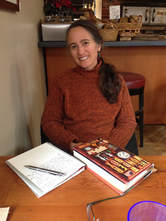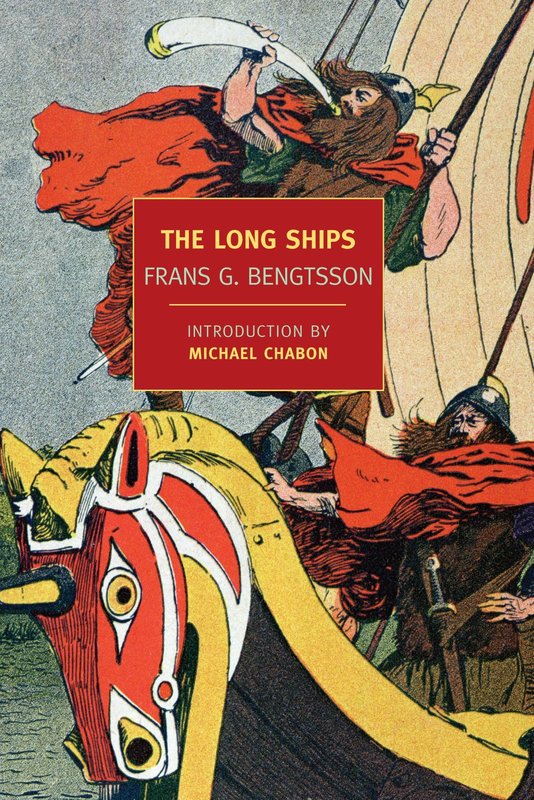|
Along for the Row: Frans Bengtsson’s The Long Ships I. TV binge-watching is a guilty pleasure for a former binge-reader. If I binge on anything, I think it should be all seven volumes of Proust’s In Search of Lost Time, say, or Moby Dick or Ulysses in a sitting. Five seasons of Michael Hirst’s Vikings, resplendent with male and female six-pack abs and shiny battle axes, doesn’t cut it—even when I try to defend the show’s merits based on the acting, the costuming, the use of old English, French, and Norse, as well as its attention to historical detail—it is the History Channel, after all! But let’s say Vikings had a source-text every bit as wonderful as the show itself. Then, I might assuage my guilt in the name of analysis, by comparing the TV show with the novel that informs it. This proves to be the case; Frans Bengtsson’s The Long Ships, first published as two separate volumes in the 1940’s, then combined into one in 1955, is rich in both the plot detail and humor that Michael Hirst mined for his scripts. Reading Bengtsson’s novel reveals how much Ragnar Lothbrok resembles Orm Toste, or how the caliph that Ragnar’s son Bjorn visits is very like Orm’s Almansur. One of Bengtsson’s captured Viking makes the same good use of his hair on the executioner’s block as his “It’s not over till it’s over” TV twin. In both, the old and new gods go head to head and even priests swap sides, themselves susceptible to pagan recidivism. Celibate priests yield (Finally! Thank you!) to the temptations of the flesh. Bengtsson’s Orm expresses a pragmatic view towards religion (which might appeal to moderns like me who have explored many, settled on none, but are inclined to pray when in turbulence at 32,000 feet) when he tells his enslaver: “We men of the north do not worship our gods except in times of necessity, for we think it foolish to weary them with babbling…Perchance it may be that our gods wield but little power in this land; therefore, lord, I for my part shall willingly obey your command and worship your God while I am your servant.” Right on. Throughout the course of the novel, Orm is Thor, Allah, and Jesus’s man in turn, ever with an eye to how his fortunes are faring. Hirst’s Ragnar is equally pragmatic, ready to perform blood sacrifices to Oden before a great voyage and to be baptized so that he can sneak his now-Christian body into a cathedral as part of a greater plan—or is it so that he can join his best friend, a Christian, in heaven after death? It doesn’t do to be too much of a stickler when it comes to matters of faith. The twenty-first century often fails to satisfy. Freed from blood sacrifice, we feel bloodless. Many of us struggle to define our tribe. We are left to cobble together rituals, which, since we fashioned them ourselves, fail to resonate. Popular movies like Fight Club explore what it means to cast about for meaningful rites of passage. Apparently, one has to speak in code and repair to grimy basement rooms in order to prove one’s mettle (or join a rugby team). There seems to be no new or untouched sacred places under the sun—all have been besmirched by selfie-stick toting tourists. In contrast, the Vikings had it easy. They identified with family and clan. They were their Jarl’s people, their King’s yeomen. They were taught to be brave, to give as good as they got, and not to whine. Both men and women trained for combat. On ritual days, they sliced something’s (or someone’s) throat and painted themselves in blood. They were close to the source. They could row to wild places free of human domestication. Who wouldn’t want to be part of that (apart from the monks at Lindisfarne)? Frans Bengtsson himself, born in Sweden in 1894, was also too late to go a-Viking. In the University of Lund, he found himself at odds with his day and age. In his essay “How I Became a Writer,” he reports: “My poems … were of ample proportions, preferably some fifty stanzas or thereabouts, and I was in the habit of reciting them…with some strong emotion, and always hoped to induce similar feelings in my listeners; but they confined themselves to stirring their coffee, scraping their pipes, cleaning their fingernails, and lapsing into a state of passivity, and recommended me with ever-increasing warmth to look at a number of Danish impressionist poets, whose productions seldom exceeded twelve lines in length.” No wonder Bengtsson returned, in The Long Ships, to an earlier time when poets were much celebrated. After Orm’s friend Toke composes some verses in praise of a king’s good ale, the king remarks: “There are few poets to be found nowadays, and few of those are able to turn out verses without sitting for hours in cogitation…I like men to whom verses come easily and who can give me some new delight each day when I dine…” I love this king. I’ll compose daily dinner verses for him. Sign me up. III. Both Bengtsson’s book and the History Channel series are bawdy. One must beget children to replace soldiers killed in battle, to ensure one’s claim on one’s landholdings into the future, to have farmhands to work the fields or oversee the slaves who work it, (and, of course, to hold the interest of readers / viewers, who expect some titillation for their time and trouble). Sex outside of commitment is only as bad as one’s partner thinks it is. If one can get away with it, why not? Women are carried off as plunder but also work surreptitiously to land the suitors they fancy. At King Harald’s great Yule feast: “No women were allowed to be present at so tremendous a drinking-bout, for it was difficult enough, King Harald thought, to keep the peace when men were by themselves, and it would be many times harder if they had women to brag to in their cups.” Orm meets his bride-to-be when flat on his back after a sword fight. They trade words, after which he opines: “Whatsoever man weds you, there will be long intervals between those occasions on which he will enjoy the last word.” Ylva responds: “I hardly think you are ever likely to be in a position to prove the truth of that remark…The way you look now, I would not lie in the same bed with you if you were to offer me five necklaces…” This sparring echoes the extended battles between TV-Ragnar and his feisty wife Lagertha. The TV series, mindful of its twenty-first century audience, goes beyond the book in not limiting its protagonists to heterosexuality, but even so, the book honors the flesh and its pleasures and the oft-problematic fascination we have with our beloveds. IV. In closing, I issue an invitation to all of you who until now have been Viking-viewers only. Find yourself a copy of Bengtsson’s The Long Ships and a reading buddy. (There is a 2010 reissue with an introduction by Michael Chabon.) Partake in the bardic tradition and recite it aloud over some thick ale. You’ll slap your sides, and it won’t be long before you are buying chain mail on e-bay and making your own wooden shields. I’ll meet you on the battle field and afterwards repair to the great hall.  Devon Balwit teaches in Portland, OR. She has six chapbooks and two collections out or forthcoming: How the Blessed Travel (Maverick Duck Press); Forms Most Marvelous (dancing girl press); In Front of the Elements (Grey Borders Books), Where You Were Going Never Was (Grey Borders Books); The Bow Must Bear the Brunt (Red Flag Poetry); We are Procession, Seismograph (Nixes Mate Books), Risk Being/ Complicated (with the Canadian artist Lorette C. Luzajic), and Motes at Play in the Halls of Light (Kelsay Books). Her individual poems can be found here and in Cordite, The Cincinnati Review, The Carolina Quarterly, Fifth Wednesday, Red Earth Review, The Fourth River, The Free State Review, Rattle, Posit, and more. Comments are closed.
|
AuthorWrite something about yourself. No need to be fancy, just an overview. Archives
April 2024
Categories |

 RSS Feed
RSS Feed
